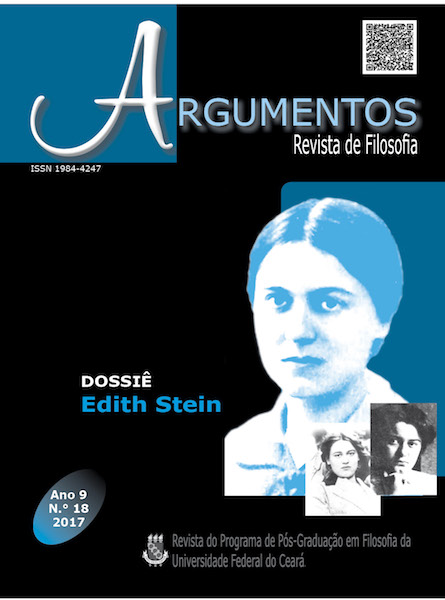The antepredicative experience in Edmund Husserl and its reception in Edith Stein's philosophy
Keywords:
Edmund Husserl. Edith Stein. Pre-predicative experience.Abstract
Pre-predicative experience was described by Edmund Husserl to circumscribe the passive reception constituting consciousness’ life. According to the Husserlian description, this is the region of affections and primordial ego orientation immediately previous to all rational activity. It is this region, which gives shape to knowledge through comparative and explicative acts (active synthesis processes). Descriptions of Husserlian pre-predicative experience can be found on a number of writings by Edith Stein, specially on Introduction to Philosophy, on the manuscript Word, truth, meaning and language, and on Eternal and Finite Being: essay on the ascension of the meaning of being. Although Edith Stein did not have access to a mature Husserlian thought on this theme, laid out on the work Experience and judgment (1939), published posthumously by Ludwig Landgrebe, the access to Husserl’s manuscripts and the intuitions of the professor already present on Lessons to a phenomenology of the internal consciousness of time have enabled the incorporation of the Husserlian pre-predicative experience on her researches.Downloads
Published
Issue
Section
License
Argumentos magazine is licensed under an International Creative Commons Attribution License.
The Magazine uses CC BY inclusion
1) The authors retain the copyright granted to the magazine or the right to initial publication, with the work regularly licensed under the Creative Commons Attribution, which allows the sharing of the work with acknowledgment of authorship and initial publication in this magazine.
2) The authors are authorized to contract additional applicable contracts, for non-exclusive distribution of the version of the work published in this journal (for example, publication in the institutional repository or as a chapter of the book), recognition of authorship and initial publication in this journal.
3) Authors are authorized and encourage to publish and distribute their work online (for example, in institutional repositories or on their personal pages) at any time before or during the editorial process, as they can generate productive changes, as well as increase the impact and reference of published work.




.jpg)










._._3.png)
1.jpg)
._._._.png)
